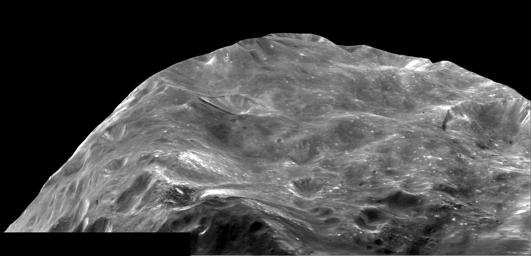
|
A View to the South
- Click the image above for a larger view
- Full-Res JPEG (3000 x 1445) (305.1 kB)
- Full-Res TIFF (3000 x 1445) (2.6 MB)
Caption:
A mosaic of two images of Saturn's moon Phoebe taken shortly after Cassini's flyby on June 11, 2004, gives a close-up view of a region near its South Pole. The view, taken about 13,000 kilometers (8,000 miles) from Phoebe, is about 120 kilometers (74 miles) across and shows a region battered by craters. Brighter material, likely to be ice, is exposed by small craters and streams down the slopes of large craters. The skyline is a combination of Phoebe's shape and the formation of impact craters. Walls of some of the larger craters are more than 4 kilometers (2.5 miles) high. The image scale is 80 meters (264 feet) per pixel.
Background Info:
The Cassini-Huygens mission is a cooperative project of NASA, the European Space Agency and the Italian Space Agency. The Jet Propulsion Laboratory, a division of the California Institute of Technology in Pasadena, manages the Cassini-Huygens mission for NASA's Office of Space Science, Washington, D.C. The Cassini orbiter and its two onboard cameras, were designed, developed and assembled at JPL. The imaging team is based at the Space Science Institute, Boulder, Colo.
For more information, about the Cassini-Huygens mission visit, http://saturn.jpl.nasa.gov and the Cassini imaging team home page, http://ciclops.org .
Cataloging Keywords:
| Name | Value | Additional Values |
|---|---|---|
| Target | Phoebe | |
| System | Saturn | |
| Target Type | Satellite | Irregular |
| Mission | Cassini-Huygens | |
| Instrument Host | Cassini Orbiter | |
| Host Type | Orbiter | |
| Instrument | Imaging Science Subsystem (ISS) | |
| Detector | ||
| Extra Keywords | Crater, Grayscale, Impact | |
| Acquisition Date | ||
| Release Date | 2004-06-14 | |
| Date in Caption | 2004-06-11 | |
| Image Credit | NASA/JPL/Space Science Institute | |
| Source | photojournal.jpl.nasa.gov/catalog/PIA06074 | |
| Identifier | PIA06074 | |
